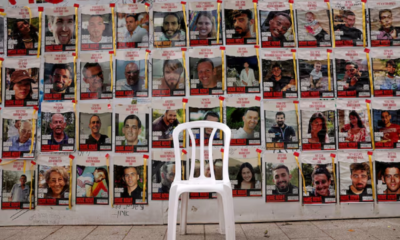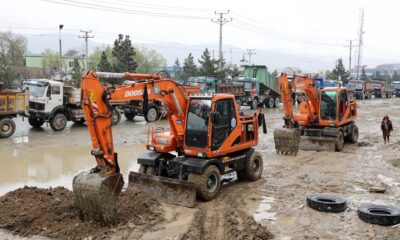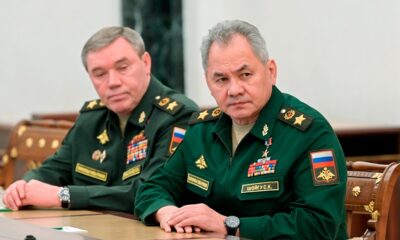Regional
Iran, US on verge of prisoner swap under Qatar-mediated deal
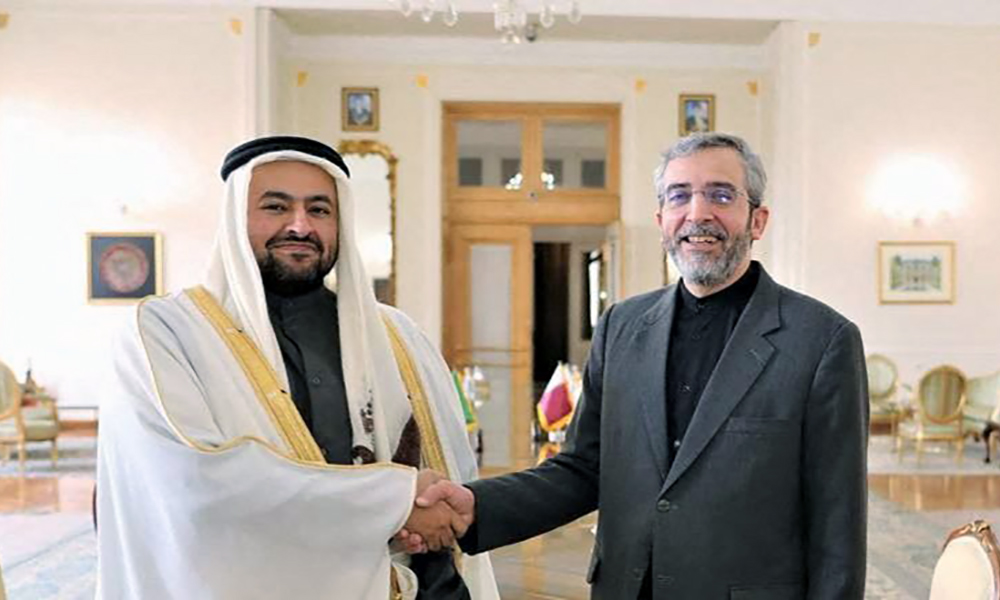
When $6 billion of unfrozen Iranian funds are wired to banks in Qatar as early as next week, it will trigger a carefully choreographed sequence that will see as many as five detained U.S. dual nationals leave Iran and a similar number of Iranian prisoners held in the U.S. fly home, according to eight Iranian and other sources familiar with the negotiations who spoke to Reuters.
As a first step, Iran on Aug. 10 released four U.S. citizens from Tehran’s Evin prison into house arrest, where they joined a fifth, who was already under house arrest. Later that day U.S. Secretary of State Antony Blinken called the move the first step of a process that would lead to their return home.
They include businessmen Siamak Namazi, 51, and Emad Sharqi, 59, as well as environmentalist Morad Tahbaz, 67, who also holds British nationality, the U.S. administration has said. The Tahbaz and Shargi families did not respond to requests for comment. A lawyer for the Namazi family declined to comment.
The identities of the fourth and fifth Americans, one of whom according to two sources is a woman, have not been disclosed. Reuters couldn’t establish which Iranian prisoners, in turn, would be swapped by the U.S.
At the centre of the negotiations that forged this deal between the superpower which Iran brands the “Great Satan” and the Islamic Republic which Washington calls a state sponsor of terrorism is the tiny but hugely rich state of Qatar.
Doha hosted at least eight rounds of talks involving Iranian and U.S. negotiators sitting in separate hotels speaking via shuttle diplomacy, a source briefed on the discussions said, with the earlier sessions focused mainly on the thorny nuclear issue and the later ones on the prisoner releases, Reuters reported.
Doha will implement a financial arrangement under which it will pay banking fees and monitor how Iran spends the unfrozen cash to ensure no money is spent on items under U.S. sanctions, and the prisoners will transit Qatar when they are swapped, according to three of the sources.
“Iran initially wanted direct access to the funds but in the end agreed to having access via Qatar,” said a senior diplomat. “Iran will purchase food and medicine and Qatar will pay directly.”
Reuters pieced together this account of previously unreported details about the extent of Qatari mediation of the secret talks, how the deal unfolded and the expediency that motivated both parties to clinch the prisoner swap deal. Reuters interviewed four Iranian officials, two U.S. sources, a senior Western diplomat, a Gulf government adviser and the person familiar with the negotiations.
All of the sources requested anonymity because of the sensitivity of a deal which hasn’t been fully implemented.
A State Department spokesperson said the U.S. was not ready to announce the exact timing of the prisoner release. The Department also declined to discuss the details of what the spokesperson termed “an ongoing and highly sensitive negotiation.”
The U.S. administration has not commented on the timing of the funds transfer. However, on Sept 5, South Korean foreign minister Park Jin said efforts were under way to transfer Iran’s funds.
“The U.S.-Iran relationship is not one characterized by trust. We judge Iran by its actions, nothing else,” the State Department spokesperson added.
Washington consented to the movement of Iranian funds from South Korea to restricted accounts held by financial institutions in Qatar, but no money is going to Iran directly, the spokesperson added.
Qatar’s Ministry of Foreign Affairs did not respond to Reuters’ request for comment on the details of negotiations, Qatar’s role in the talks or the terms of the final agreement.
Iran’s foreign ministry and its U.N. mission did not respond to detailed questions regarding this story, read the report.
The sources’ account of the negotiation shows how the deal sidestepped the main U.S.-Iran dispute over Iran’s nuclear aims, culminating in a rare moment of cooperation between the long-time adversaries, at odds on a host of issues from Iran’s nuclear program to the U.S. military presence in the Gulf.
Ties between the U.S. and Iran have been at boiling point since Donald Trump quit a nuclear deal with Iran as U.S. president in 2018. Reaching another nuclear deal has gained little traction since then, as President Joe Biden prepares for the 2024 U.S. election.
The State Department spokesperson also said there had been no change in Washington’s overall approach to Iran, “which continues to be focused on deterrence, pressure and diplomacy.”
Once the funds are transferred, they will be held in restricted accounts in Qatar, and the U.S. will have oversight as to how and when these funds are used, the State Department spokesperson added.
The potential transfer has drawn Republican criticism that Biden, a Democrat, is in effect paying ransom for U.S. citizens. But Blinken told reporters on Aug 10 the deal does not mean that Iran would be getting any sanctions relief, explaining that Washington would continue to push back “resolutely against Iran’s destabilising activities in the region”.
The Qatari-led mediation gained momentum in June 2023, said the source briefed on the discussions, adding at least eight rounds of talks were held since March 2022, with earlier rounds devoted mainly to the nuclear issue and later ones to prisoners.
“They all realised that nuclear (negotiation) is a dead end and shifted focus to prisoners. Prisoners is more simple. It’s easy to get and you can build trust,” he said. “This is when things got serious again.”
The Iranian, diplomatic and regional sources said that once the money reaches Qatar from South Korea via Switzerland, Qatari officials will instruct Tehran and Washington to proceed with the releases under the terms of a document signed by both sides and Qatar in late July or early August. Reuters has not seen the document.
The transfer to banks in Qatar is expected to conclude as early as next week if all goes to plan, the source briefed on the talks said. Reuters was unable to identify the banks involved.
“American prisoners will fly to Qatar from Tehran and Iranian prisoners will fly from the U.S. to Qatar, and then be transferred to Iran,” the source briefed on the talks told Reuters.
According to two Iranian insiders, the source briefed on the negotiations and the senior Western diplomat, the talks’ most complex part was arranging a mechanism to ensure transparency in the money transfer and respect for U.S. sanctions. The $6 billion in Iranian assets – the proceeds of oil sales – were frozen under sweeping U.S. oil and financial sanctions against Iran. Then president Trump in 2018 reimposed the sanctions when he pulled Washington out of a deal under which Iran had restricted its nuclear program.
Issues discussed included how to ensure Iran only spent the money on humanitarian goods and securing guarantees from Qatar on its monitoring of the process.
“To salvage the negotiations from collapse, Qatar pledged to cover the banking fees for the funds’ transfer from Seoul to Switzerland, and subsequently to Qatari banks, while also taking on the responsibility of expense oversight,” an Iranian insider briefed about the talks told Reuters.
The central bank governors of Iran and Qatar met in Doha on June 14 to discuss the funds transfer, a second Iranian insider and the source briefed on the talks said.
According to Reuters the Central Bank of Iran and the Qatar central bank declined to comment.
The talks were led by U.S. Special Envoy for Iran Robert Malley — now on unpaid leave because his security clearance is under review — and by U.S. Deputy Special Envoy Abram Paley and Iran’s chief nuclear negotiator, Ali Bagheri Kani, said one Iranian official, two sources briefed on the negotiations and the Western diplomat.
Mehdi Safari, Iran’s deputy foreign minister for economic affairs, joined the Iranian delegation at two meetings in Qatar for talks on the funds transfer, one senior Iranian diplomat told Reuters. Qatari Minister of State at the Foreign Ministry Mohammed Al-Khulaifi was the go-between mediator.
Malley declined to comment. Paley, Kani and Al Khulaifi could not be reached directly for comment.
Regional
China to host Hamas, Fatah for Palestinian unity talks

China will host Palestinian unity talks between Hamas and its rivals Fatah, the two groups and a Beijing-based diplomat said on Friday, a notable Chinese foray into Palestinian diplomacy amid the war in the Gaza Strip.
Hamas, which controls Gaza, is the group whose fighters stormed into Israeli towns on Oct. 7, killing 1,200 people and capturing 253 hostages. Israel has sworn to annihilate Hamas in an onslaught that has killed more than 34,000 Palestinians.
Fatah is the movement of Mahmoud Abbas, president of the Western-backed Palestinian Authority, which exercises limited self-rule in the Israeli occupied West Bank.
The two rival Palestinian factions have failed to heal their political disputes since Hamas fighters expelled Fatah from Gaza in a short war in 2007. Washington is wary of moves to reconcile the two groups, as it supports the PA but has banned Hamas as terrorists.
A Fatah official told Reuters a delegation, led by the group’s senior official Azzam Al-Ahmed, had left for China. A Hamas official said the faction’s team for the talks, led by senior Hamas official Moussa Abu Marzouk, would be flying there later on Friday.
“We support strengthening the authority of the Palestinian National Authority, and support all Palestinian factions in achieving reconciliation and increasing solidarity through dialogue and consultation,” said Chinese Foreign Ministry spokesperson Wang Wenbin at a regular briefing on Friday, without confirming the meeting.
The visit will be the first time a Hamas delegation is publicly known to have gone to China since the start of the war in Gaza. A Chinese diplomat, Wang Kejian, met Hamas chief Ismail Haniyeh in Qatar last month, according to the Chinese foreign ministry.
The Beijing-based diplomat, who had been briefed on the matter, said the talks aimed to support efforts to reconcile the two Palestinian rival groups.
China has lately demonstrated growing diplomatic influence in the Middle East, where it enjoys strong ties with Arab nations and Iran. Last year, Beijing brokered a breakthrough peace deal between longstanding regional foes Saudi Arabia and Iran.
U.S. Secretary of State Antony Blinken said he discussed with Chinese President Xi Jinping and other officials in Beijing on Friday how China can play a constructive role in global crises, including the Middle East.
Chinese officials have ramped up advocacy for the Palestinians in international forums in recent months, calling for a larger-scale Israeli-Palestinian peace conference and a specific timetable to implement a two-state solution.
In February, Beijing urged the International Court of Justice (ICJ) to give its opinion on the Israeli occupation of the Palestinian Territories, which it said was illegal.
More recently, China has been pushing for Palestine to join the United Nations, which Beijing’s top diplomat Wang Yi said last week would “rectify a prolonged historical injustice”.
(Reuters)
Regional
New UK sanctions target Iranian drone industry

Britain on Thursday announced new sanctions targeting Iran’s military drone industry, in response to Iran’s drone and missile attack on Israel earlier this month.
The measures, taken in co-ordination with the U.S. and Canada, target four businesses and two directors at a network of drone companies with the aim of limiting Iran’s ability to launch drones.
“The Iranian regime’s dangerous attack on Israel risked thousands of civilian casualties and wider escalation in the region,” British Foreign Secretary David Cameron said in a statement.
“Today the UK and our partners have sent a clear message – we will hold those responsible for Iran’s destabilising behaviour to account.”
Britain also said it would introduce new bans on the export of drone and missile components to Iran, seeking to limit its military capabilities.
Last week, Britain imposed sanctions on Iranian military figures and organisations, in another coordinated move with the United States, following Iran’s action against Israel.
Iran launched drones and fired missiles at Israel on April 13 as a retaliatory strike for the attack on its embassy compound in Damascus two weeks prior, raising the risk of further escalation in conflict in the Middle East.
(Reuters)
Regional
Turkey accuses U.S. of double standards over Gaza in rights report
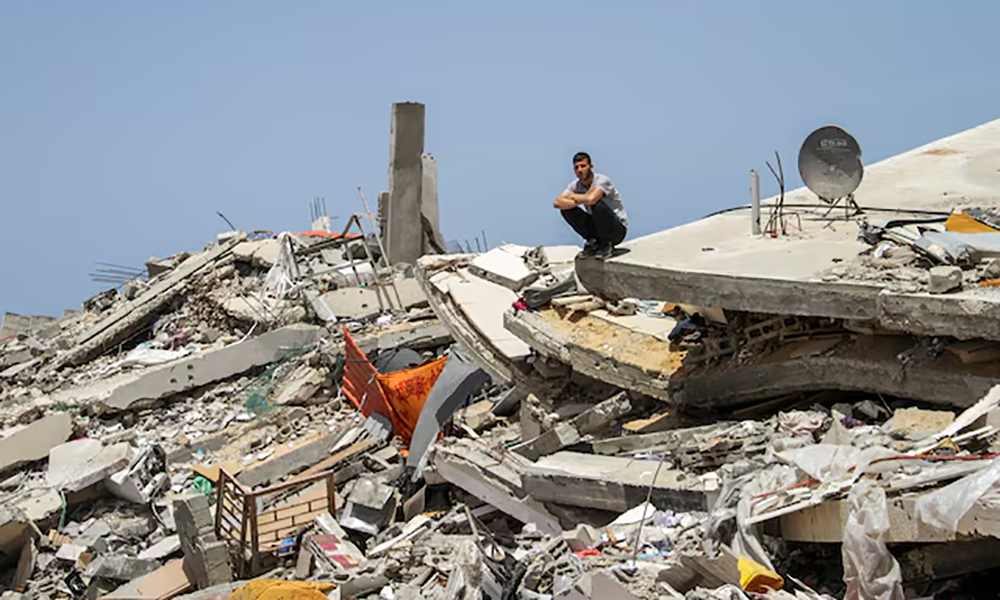
Turkey on Wednesday accused the United States of having a policy of double standards on human rights, saying Washington’s annual rights report failed to reflect Israel’s assaults in Gaza, Reuters reported.
Turkey’s foreign ministry said in a statement it was deeply concerned that the U.S. report did not “duly reflect the ongoing inhumane attacks in Gaza”.
The report was prepared with “political motives, far from impartiality and objectivity”, it said, calling on Washington to cease its “double-standard policy on human rights”.
It also cited U.S. ties with the Syrian Kurdish YPG militia which Ankara deems a terrorist organisation.
Israeli forces have killed more than 34,000 Palestinians in Gaza, according to health authorities there, many of them civilians and children. The enclave has been reduced to a wasteland and extreme food shortages have prompted fears of famine.
Israel launched its assault in response to an attack by the Hamas militant group on Oct. 7 in which Israel says 1,200 people were killed. It denies allegations of deliberately causing humanitarian suffering and targeting civilians.
Turkey has denounced Israel for its campaign in Gaza and called for a ceasefire. It has also criticised Western countries for what it calls their unconditional support of Israel, read the report.
In its report, the U.S. State Department said Israel’s war against Hamas had a “significant negative impact” on the human rights situation in Israel.
On Monday, U.S. Secretary of State AntZony Blinken rejected suggestions that Washington might have double standards over Israel’s record.
-

 Latest News4 days ago
Latest News4 days agoRashid Khan named AWCC’s brand ambassador
-

 World4 days ago
World4 days agoMalaysian navy helicopters collide in mid-air, 10 killed
-

 Sport4 days ago
Sport4 days agoJaiswal ton powers Rajasthan to big IPL win
-

 World4 days ago
World4 days agoNorth Korea officials visit Iran in a rare public trip
-

 Latest News5 days ago
Latest News5 days agoAt least 1,500 families affected by recent floods: IRW
-

 Sport4 days ago
Sport4 days agoMawj Sahil player scores stunning halfway line goal in 1-0 win over Jawanan Wahedi
-

 Sport3 days ago
Sport3 days ago‘Serious talent’ Fraser-McGurk bonds with Warner to light up IPL
-

 Latest News4 days ago
Latest News4 days agoUS report cites ‘significant deterioration’ in Afghan women’s rights last year




